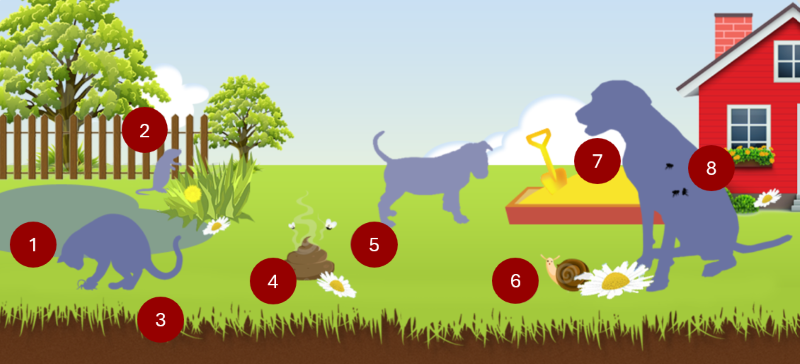What are worms in dogs?
Whether you’ve had experience with them or not, you’ll probably be aware that worms inside your dog are no good thing. Not only can they cause health problems in your dog (with puppies particularly at risk), some of them can even cause disease in you and your family. Find out everything you need to know about worms in dogs and how to help keep your pet healthy.
What are the different types of worms in dogs?
Roundworms, tapeworm and lungworm are the primary culprits in UK dogs. Other worms are uncommon in the UK except where large numbers of dogs live together. Your pet’s lifestyle will often dictate which parasites they are most at risk from – your vet will be able to advise further.
 Roundworms
RoundwormsRoundworms are the most common intestinal worm in dogs, with puppies being particularly at risk.
 Tapeworms
TapewormsTapeworms are one of the most common parasites affecting dogs and one type can be spread by fleas.
 Lungworm
LungwormLungworm can be fatal to dogs if left untreated. Dogs become infected by eating infected slugs and snails, or prey animals that are infected with lungworm.
 Whipworms
WhipwormsWhipworms can affect dogs in the UK, but generally where large numbers of dogs cohabit, such as a kennels, as it takes a large amount of eggs to cause an infection.
 Hookworms
HookwormsHookworms affect dogs and can be picked up from walking on soil containing the larvae and latch on to the intestinal lining, to feed on blood.
 Heartworms
HeartwormsHeartworms are transmitted by mosquitoes and have only been found in dogs in the UK that have travelled from other countries. If you are taking your dog abroad, speak to your vet about preventative treatment.
 Eyeworms
EyewormsEyeworms occur in dogs, cats and humans in southern Europe and are transmitted by flies picking up the infection from the tears of animals and humans.
Signs of worms in dogs
It’s not always immediately obvious that your dog has worms, so often you won’t know for sure. Symptoms in adult dogs are hard to spot unless the infestation is severe. Some worms move into the respiratory system as they develop and may cause a cough in your dog. One way you can spot worms in your dog is by keeping an eye on their faeces and checking their vomit if they fall ill. Roundworms will appear spaghetti-like and white, or light brown in colour and can grow several inches long. If you spot what look like grains of rice in your dog’s poop, this is a sign they may have a tapeworm infection.
Puppies are more likely to display symptoms of worms. An infection can lead to diarrhoea, vomiting, weight loss, a dull coat or a pot belly. However, almost all puppies are born with roundworms, so even those that appear healthy will usually have some worms inside them.
How do dogs get worms?
This is a very common veterinary question about dogs. People can sometimes feel guilty if their dog has worms, but actually almost all puppies are born with roundworms, and it is so easy for dogs to be exposed to a range of parasites throughout their lives. Lungworm, for instance, can be contracted when your dog accidentally or deliberately ingests slugs or snails whilst rummaging through undergrowth, eating grass, drinking from puddles or outdoor water bowls, or picking them up from their toys. All of which are part of a normal day for most dogs! Your vet will be able to tell you more about the specific risks to your pet depending on their lifestyle and where in the country you live.
See what could be lurking beneath a garden or park ...

- Scavenging: dogs could become infected by eating dead animals - for example a bird or rabbit killed on the road - or undercooked or raw meat that they might find in a bin.
- Hunting: rodents and rabbits carry worms and are a risk to hunting pets.
- Soil and sand: is often contaminated with parasitic eggs which can be easily swallowed by dogs.
- Dog or cat faeces: some worms and eggs are transmitted in the faeces of infected animals.
- Other dogs: can be infected and pose a risk to your dog.
- Slugs/snails: can carry a parasite called lungworm which can be passed to your dog if they eat it.
- Sandpits: parks and playgrounds have been shown to have high levels of worm egg contamination.
- Fleas: can be infected with tapeworm which can pass to your dog if they are swallowed.
Frequently Asked Questions
Want to find out more about worms? Check out our frequently asked questions below.
